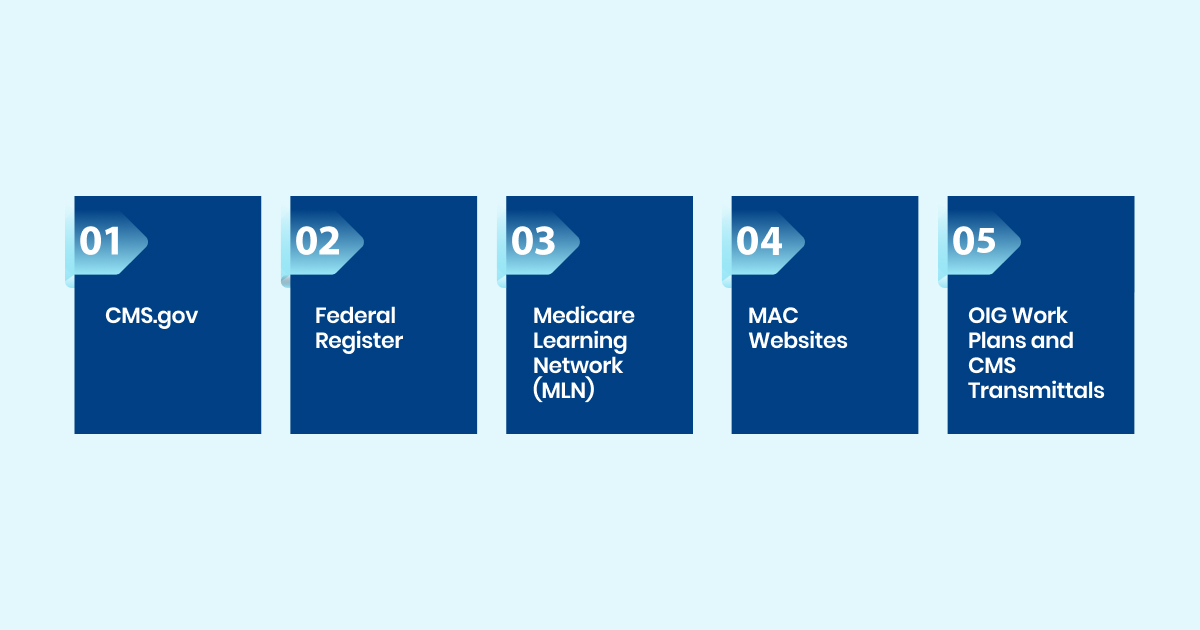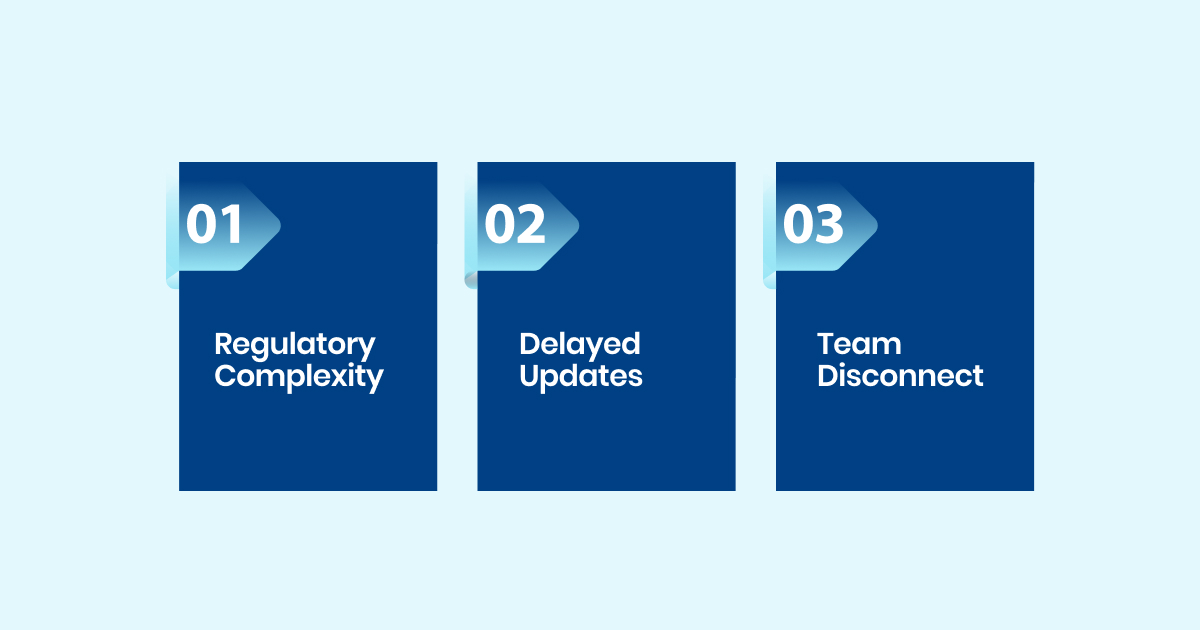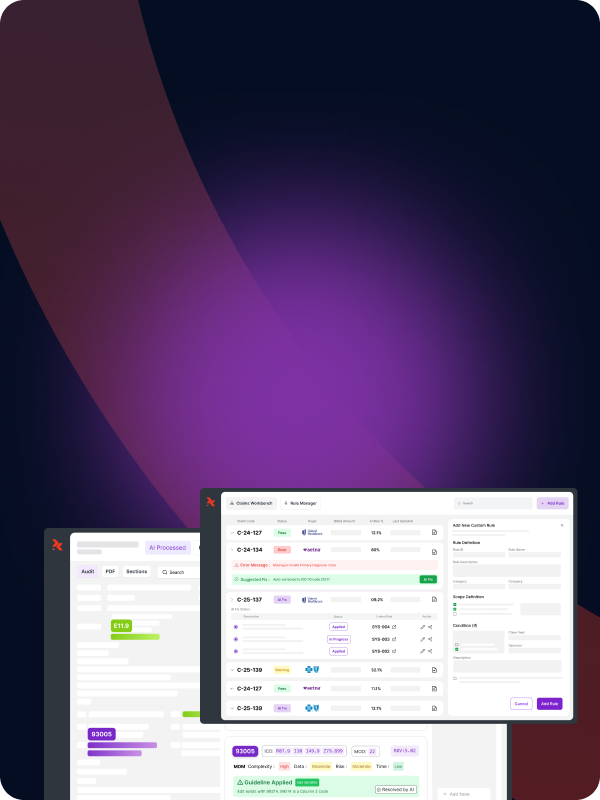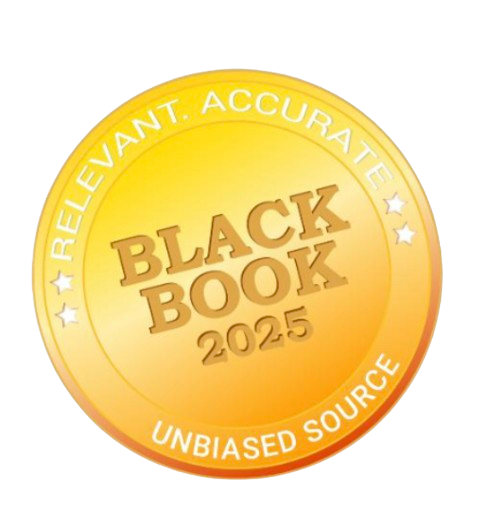.webp)
Staying Updated on CMS Guidelines and Policies


Keeping up with CMS (Centers for Medicare & Medicaid Services) guidelines is essential for healthcare providers, coders, and administrators who manage billing, compliance, and reimbursements. These guidelines form the backbone of correct documentation, accurate coding, and timely claim approvals.
Missing even a minor update can result in claim denials, financial penalties, or increased audit risks. Whether it's a change in Evaluation and Management (E/M) rules, telehealth reimbursement, or modifier usage, staying informed is not optional in today’s healthcare environment.
This blog outlines the importance of CMS updates, where to find official information, tools that simplify tracking, and tips to stay compliant in a fast-changing regulatory landscape.
TL;DR (Key Takeaways)
- Ignoring CMS updates increases the risk of denials, audits, and compliance issues.
- Key sources like CMS.gov, MLN Matters, and MAC sites provide timely policy guidance.
- Using coding tools with real-time policy sync helps reduce manual tracking errors.
- Monthly update reviews and role-specific training keep teams aligned and audit-ready.
- Overcoming jargon and communication gaps requires cross-functional collaboration and documentation workflows.
Why CMS Updates Matter
Healthcare reimbursement evolves continuously. CMS regularly updates policies that impact coding accuracy, reimbursement timelines, and audit exposure. These updates directly affect how care is delivered, documented, and billed.
- E/M Code Revisions: CMS frequently updates Evaluation and Management (E/M) guidelines to simplify documentation and shift focus to medical decision-making. Not adapting to these changes can result in incorrect code selection, reduced reimbursement, or audit risk.
- Telehealth Policy Adjustments: Coverage for telehealth continues to change, especially after the pandemic. Rules regarding audio-only services, geographic eligibility, and covered providers vary each year. Missing these updates often leads to billing errors or denials.
- Modifier and Code Pair Changes: CMS refines how modifiers like 25, 59, and 95 should be used. They also update NCCI edit pairs and bundling logic. Incorrect use can cause automatic claim rejections.
- Documentation Requirements: Requirements for time-based services, critical care, and split-share billing are revised regularly. Providers need to align note-taking and templates with the latest standards to ensure proper coding and reimbursement.
- Different Providers, Different Impact
- Hospitals need to update DRG logic and outpatient billing rules
- Private practices must revise CPT mappings and EHR workflows
- Coding vendors need fast adaptation across client systems to maintain accuracy and TAT
These updates are not optional. They are tied to revenue integrity, regulatory compliance, and patient satisfaction. Staying ahead means fewer denials and smoother reimbursements.
Key Sources to Track CMS Policy Changes

To stay compliant and maintain accurate reimbursement workflows, it's important to follow trusted, up-to-date sources. Below are essential platforms that healthcare providers, billing teams, and coders should monitor regularly:
- CMS.gov: The official website of the Centers for Medicare & Medicaid Services offers comprehensive policy updates, including final rules, coverage decisions, and quarterly coding revisions. It also hosts important resources like NCCI edits, HCPCS updates, and physician fee schedules.
- Federal Register: All proposed and finalized regulatory changes affecting Medicare and Medicaid are published here. It's the go-to source for advance notice of upcoming CMS rule changes.
- Medicare Learning Network (MLN): MLN Matters articles provide plain-language explanations of policy changes, coding guidelines, and billing updates. These are especially helpful for training coders and educating provider teams.
- MAC (Medicare Administrative Contractor) Websites: Each MAC provides region-specific policy updates, Local Coverage Determinations (LCDs), and training resources. These sites also communicate audit trends and implementation timelines.
- OIG Work Plans and CMS Transmittals: The Office of Inspector General (OIG) Work Plan highlights enforcement priorities that may affect claims and coding audits. CMS Transmittals detail operational guidance for claims processing, including edits and system changes.
Tracking these sources ensures your team can adapt to regulatory shifts proactively instead of reacting to denied claims or audit flags.
Tools and Subscriptions That Help
Staying compliant with CMS policy changes requires more than occasional website visits. The right mix of tools and subscriptions can help streamline how updates are tracked, interpreted, and implemented in real workflows.
- CMS Listservs and Newsletters: Subscribing to CMS listservs gives you direct access to policy announcements, regulation updates, and coverage changes. These alerts are often sent ahead of implementation dates, giving teams time to prepare. Prioritize updates from Medicare FFS Providers, MLN Connects, and Open Door Forums.
- Coding Software with Real-Time CMS Sync: Not all coding tools are created equal. Look for platforms that integrate directly with CMS data repositories or NCCI edit updates. Tools that require manual update cycles risk falling behind, especially when quarterly revisions or emergency policy shifts (such as those during the COVID-19 pandemic) occur.
- Compliance Monitoring Tools and Alert Systems: Automated compliance platforms can track rule changes and cross-check your claims in real time. They flag mismatches with current CMS policies before submission. This is especially useful in multi-specialty or high-volume settings where manual oversight is impractical.
- AAPC and AHIMA Member Resources: Beyond certification, these professional organizations offer in-depth guidance through webinars, coding updates, audit reports, and specialty-specific recommendations. Their summaries often clarify nuances in CMS updates that may be buried in formal language or technical transmittals.
- AI Tools with Built-In Billing Logic Updates: AI-powered platforms like RapidClaims automatically sync with CMS updates and adjust billing logic in real time. These tools help validate E/M levels, modifiers, and procedure codes based on the latest guidelines. With built-in rationale and audit support, RapidClaims enables coding teams to stay compliant without manual rule tracking. This not only reduces training time but also cuts down errors linked to outdated policies.
Tips for Staying Proactive
Staying ahead of CMS policy updates requires more than just reading announcements. It demands active monitoring, timely training, and tools that help your team interpret and apply changes before they impact claims or compliance metrics. Here are practical strategies to make your organization more policy-ready:
- Assign Accountability for Policy Oversight: Designate a compliance officer or create a rotating internal team responsible for monitoring CMS changes. For example, larger hospital systems often have a policy review board, while smaller practices can rely on a certified coder or practice manager to lead.
- Institutionalize Monthly Policy Syncs: Set up monthly sessions to review updates from CMS, MLN Matters, and MAC websites. Use actual claim scenarios to demonstrate how new rules affect E/M levels, time-based billing, or modifier use. RapidClaims users, for instance, often use its audit trail to show pre- and post-policy coding changes in training sessions.
- Develop a Change Implementation Framework: Create a documented process for handling policy changes: identify the update, assess affected workflows, train staff, and update tools or templates. For example, if a new CPT code is added for remote monitoring, your team should know how it affects both clinical documentation and billing software.
- Track Proposed and Final Rules Separately: Use tools like CMS.gov alerts, Becker’s Hospital Review, or RapidClaims' real-time policy sync to distinguish between proposed and finalized changes. This prevents confusion and lets your organization prepare in advance without overhauling workflows prematurely.
Challenges and How to Overcome Them

Staying updated with CMS policies requires more than just reading announcements. The real challenge lies in operationalizing that information across coding, billing, and clinical teams without disruption.
- High Volume of Changes and Regulatory Jargon: CMS releases hundreds of updates each year. Many come with dense legal language and cross-references that slow down interpretation. To cut through the clutter, use platforms like RapidClaims or compliance tools that convert policy changes into clear, actionable coding logic. Assigning a compliance analyst to summarize key updates each week also helps focus attention.
- Delayed Dissemination Across Teams: Policy changes often stall between receipt and implementation. Internal communications may not reach coders, or updates may sit unread in inboxes. Embedding updates into team huddles, internal LMS quizzes, or coding tools ensures that critical changes are not missed. RapidClaims, for instance, reflects new code edits and modifiers directly in coder workflows.
- Disconnect Between Clinical, Coding, and Billing Functions: When providers, coders, and billing teams interpret CMS rules differently, it creates inconsistencies. This leads to denials, delays, or audit exposure. The solution is shared ownership. Organize monthly cross-functional sessions where teams walk through one rule change together and apply it to a real case. These collaborative reviews help align documentation, coding, and billing in practice; not just in theory.
Final Thoughts and What to Do Next
Staying current with CMS guidelines is not just about avoiding penalties. It is about protecting your revenue cycle, maintaining coding accuracy, and preparing your teams for the next update before it affects your claims.
If your organization is still relying on manual methods to track CMS changes, this is the right time to modernize. Assign responsibility, create structured review processes, and adopt tools that simplify the work.
Solutions like RapidClaims automatically sync with CMS updates, flag outdated logic, and guide your team toward compliant coding. This helps reduce the risk of denials and audit triggers.
Request a Demo to see how RapidClaims can help you stay ahead of policy changes with confidence.
Frequently Asked Questions
1. How often does CMS update its coding guidelines?
Ans: CMS typically issues updates quarterly, with major changes released annually in the Physician Fee Schedule Final Rule and CPT/HCPCS code sets. Providers should monitor CMS.gov and MAC websites regularly to avoid outdated practices.
2. What is the best source for real-time CMS policy updates?
Ans: The most authoritative sources include CMS.gov, the Federal Register, and Medicare Learning Network (MLN) Matters. Subscribing to CMS listservs is also highly effective for getting timely alerts.
3. What happens if a practice doesn’t follow updated CMS guidelines?
Ans: Failure to implement CMS changes can lead to denied claims, overpayments that must be refunded, increased audit risk, and potential legal or financial penalties.
4. How can small practices stay compliant without a large compliance team?
Ans: They can rely on AI-powered coding platforms like RapidClaims, which auto-sync with CMS updates and apply real-time coding logic. Using tools with built-in compliance and audit trails reduces manual effort and error risk.
5. Are proposed CMS rules enforceable immediately?
Ans: No. Proposed rules are subject to public comment and are not binding until finalized. However, it is advisable to begin internal reviews of potential impact once they’re published in the Federal Register.
6. Can EHR systems handle CMS coding updates automatically?
Ans: Some modern EHRs can integrate CMS updates, but many require manual intervention. Supplementing EHRs with AI-based tools like RapidClaims ensures updates are reflected directly in coding workflows without delay.
%201.png)









